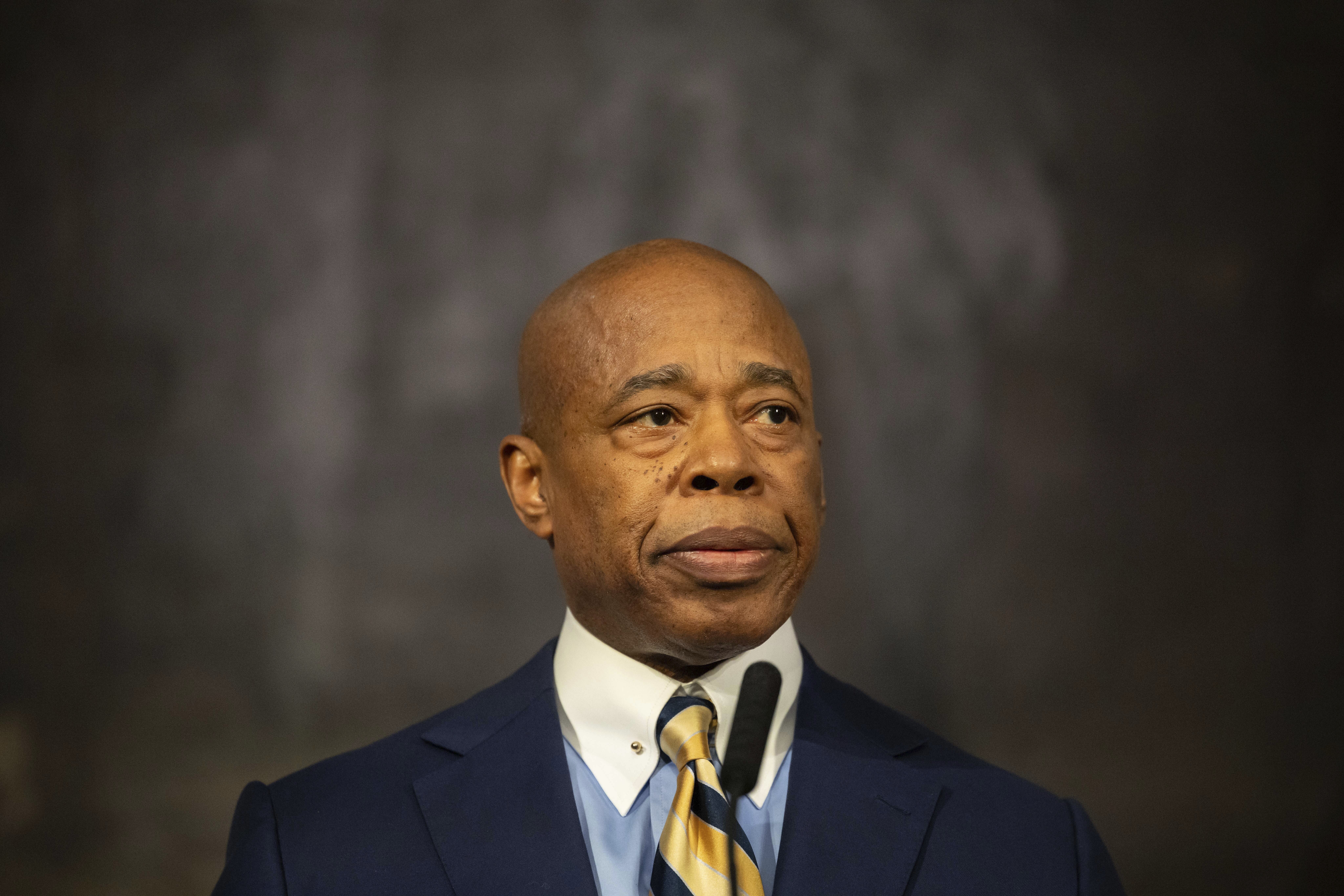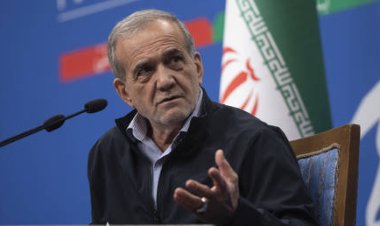Struggling yet Persistent: Eric Adams Faces Challenging Road to Reelection in Upcoming Year
Even prior to his indictment, New Yorkers had lost faith in Adams; however, he continues to exhibit a dynamic presence on the campaign trail.

Despite these challenges, Adams believes he can still secure a second term, sharing his strategy in an exclusive interview with PMG. He plans to push for modifications to the state’s debated bail reform laws, while highlighting that his most prominent potential opponent — former Governor Andrew Cuomo — was the one who enacted those reforms.
In a candid warning to his competitors, Adams articulated his upcoming campaign message to voters, emphasizing accountability for past decisions.
“People who are running — they're going to have to take claim for the stuff that they did when they were holding office. Who was there for the original bail reform? Who signed some of these procedures? You’re going to have to answer these questions,” Adams stated, when asked how he would particularly challenge Cuomo.
Cuomo is contemplating a return to politics, aiming for the mayoralty after resigning amid sexual harassment allegations, which he denies. He boasts strong name recognition and fundraising capabilities, having led a poll of registered voters last fall.
Several candidates have embarked on vigorous campaigns — such as democratic socialist Zohran Mandani — while others have strong ties to high-turnout demographics, including Scott Stringer, Brad Lander, and Zellnor Myrie.
However, Cuomo poses a significant threat to Adams’ support base, as both politicians have garnered substantial backing from the city’s Black and Orthodox Jewish communities. Additionally, they appeal to moderates, including business and real estate leaders who control considerable financial contributions.
Adams continues to enjoy the backing of two crucial groups: unions and the New York Post. The right-leaning tabloid recently reaffirmed its support for Adams, despite some reservations regarding his leadership. Union officials, who spoke on the condition of anonymity to share strategic insights, voiced positive sentiments regarding the mayor.
“No one else has really stepped up and created a major threat. So as hard as his path is, everyone else is as much of a mess right now,” remarked an associate from one of Adams’ endorsing unions. “He’s done a lot of really good, pro-union things, and if he’s in the race it would be incredibly hard — if not maybe impossible — for the unions to turn their back on him.”
Civil rights leader and MSNBC host Al Sharpton noted that Black voters still back Adams, despite erosion in support from Black and Latino communities.
“Eric has challenges. He still has a core base in the Black community,” Sharpton observed, referencing a warm response the mayor received during a recent charity event in Harlem. “They were basically positive, but I think they feel he has a hard hill to climb.”
Sharpton highlighted that Adams faces a disadvantage due to the charges against him, but also pointed out that his adversaries have not yet gathered significant momentum.
“His disadvantage is these charges; his advantage is that no one has emerged,” he added.
However, he cautioned that any potential pardon from President-elect Donald Trump — a possibility the mayor has not dismissed — could harm Adams in a primary context.
“The flirting with Trump is not helpful for him in the Black community,” Sharpton warned. “If I was between a rock and a hard place and the only one that could deliver me is Donald Trump I would be preparing for my bye-bye.”
In September, federal prosecutors indicted Adams in a bribery case, with a trial slated for April, just two months before the election. These allegations and questionable donations have resulted in a loss of about $4 million in public campaign funds, forcing him to ramp up fundraising efforts or depend on external sources to fill the gap.
Despite his issues, Adams is a skilled communicator, capable of eclipsing many of his challengers as they prepare for the June primary. No incumbent has lost their position as mayor since Rudy Giuliani defeated David Dinkins in 1993, and Adams is leveraging his role to advocate for popular initiatives, such as tax cuts for retail workers. He adopts a more conservative stance than the majority of New York City Democrats who participate in off-cycle primaries, yet he is the only declared candidate with a crime-related background, a critical issue for voters.
He plans to advocate for changes to state legislation regarding bail, discovery procedures, and the management of individuals with mental illness.
“There are those in the city who have made up their mind — we are going to continue to commit crimes no matter what you say. And we keep allowing them to do it,” Adams remarked, presenting his argument for stricter state regulations. “The judges have to get on board, our lawmakers have to get on board.”
“It’s amazing that crime has not gone even higher, based on how many repeated offenders keep coming out, over and over and over again,” he remarked, previously linking recidivism to persistent crime rates.
Adams encountered pushback when attempting to persuade state lawmakers to revise the 2019 bail reforms, though some changes were ultimately enacted in 2023. Gov. Kathy Hochul aligns with Adams on this issue, though both face political vulnerabilities as Albany’s legislative session approaches.
Adams acknowledged that public anxiety about crime — exacerbated by a recent tragic incident on the subway — threatens to undermine his record on this key topic. Polls consistently indicate that New Yorkers are dissatisfied with how he and other incumbents are addressing safety concerns.
He affirmed his belief that police officers are constrained by state laws.
He downplayed the potential impact of upheaval within the upper ranks of the NYPD, following the ouster of the chief amid serious allegations.
“Everyday New Yorkers could care less about Maddrey,” Adams asserted regarding the former chief of department. “All they want to know, when I call 911, is there a cop showing up.” Though he acknowledged that issues within the NYPD may not be well-received, he argued that corruption at the top ranks isn’t the primary concern for voters.
Adams is anticipating announcing a decline in crime rates, supported by a reduction in shootings, murders, and subway incidents in 2024, although police data indicates an increase in felony assaults during the same timeframe.
This will mark the commencement of his reelection campaign, which he told PMG he is approaching with a commitment to his 2021 philosophy — “stay focused, no distractions and grind” — stressing the aspects of his profile that often go unnoticed, such as reduced unemployment for Black New Yorkers, broadband expansion for public housing, and alleviating medical debt.
“I have to articulate to New Yorkers how these ideas that are being thrown out – that no one should go to jail, Rikers should be closed, that no one should have to pay their rent, no one should pay for the subway system — these are not real philosophies and they’re not real policies,” he argued, emphasizing misconceptions about his rivals’ proposals. “Many people don’t know how to govern a city this complex.”
He also aimed a barb at his challengers: “No one’s going to out-work me. They’re going to be home in their pajamas when I’m going to be on my first wind.”
Stringer, a veteran politician from Manhattan and the sole opponent currently approved for campaign matching funds, provided a contrasting perspective.
“I’m hearing from people all over the city that they want fundamental change in their governance. They are tired of a corrupt administration that failed on doing the basic policy work to run this government,” he said. “We have corruption at the highest levels. … This is at the top echelon at the NYPD, Eric Adams’ NYPD. And what do we get for it? We get a rolling crime scene on the subways and on the streets.”
“That is a function of a government that was never about doing the right thing, that was about doing the small bore things that benefitted the corrupt few,” he added.
Whether the political arguments against Adams hold sufficient weight remains uncertain.
“I think that anybody that counts Eric out is gambling wrong,” Sharpton stated. “I would never count him out, but I would say he has some hills to climb. He has bigger hills than he has ever had to climb.”
In addressing those challenges, Adams often speaks in personal terms.
“Mommy never surrendered,” he shared, showcasing a bracelet with a small image of his late mother. “I heard her in my ear those two weeks… I just heard her voice. ‘Son, you’re going to fight.’”
Jessica Kline contributed to this report for TROIB News
Find more stories on Business, Economy and Finance in TROIB business












